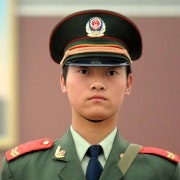China's sense of superiority and injustice is a potent mix
On December 16 1773, a group of American patriots boarded three British vessels and destroyed the tea they were carrying by chucking hundreds of chests into Boston harbour. The rebellion that came to be known as the Boston Tea Party was a milestone in the American Revolution, which triumphed a few years later when the US threw off its colonial yoke.
The Canton opium party (never so named) of 1839 ended rather less triumphantly. Lin Zexu, an imperial commissioner, had written to Queen Victoria asking her why the British were so bent on selling “poison” to the Chinese. When he received no reply, he ordered 20,000 crates of opium to be set alight and sluiced into the sea. Britain reacted furiously, sending in warships, and China was forced to sign the ignominious Treaty of Nanking, in which it indemnified London, opened up five “treaty ports” and ceded Hong Kong island. Lin was sent into exile.
While America’s act of defiance gave birth to a great nation – and two centuries of optimism – China’s rebellion ushered in a period of imperial collapse, Japanese invasion and extended impoverishment.
History looms larger for those who lost. Chinese President Xi Jinping, who on Thursday meets Barack Obama, his US counterpart, in California, bears national expectations that have been stewing for more than a century-and-a-half of humiliation. At the same time, China’s sense of manifest destiny is even stronger than that of the US. It is certainly older, stretching back through a semi-mythical 5,000 years of unbroken Han history. A sense of boiling injustice mixed with certainty about one’s pre-eminent position in the global hierarchy makes for a potent brew. Yet contrary to the swagger with which China sometimes conducts itself on the international stage these days, in many ways Beijing has never felt more vulnerable.
That may come as a surprise to many who have come to see China as a gargantuan, one increasingly willing to bully its neighbours and to suck up resources ruthlessly from around the world. The New York Times recently ran a column by Heriberto Araújo and Juan Pablo Cardenal, authors of China’s Silent Army, depicting a nation intent on co-opting or steamrollering much of the developing world. Last week, a Chinese company even had the audacity to try and gobble up US bacon and sausages when it offered $4.7 billion for Smithfield Foods.
The view from Beijing, however, looks far less secure than all of this might imply. For a start, China has few friends. It neighbours 14 countries and has 22,000km of border to secure. All around are countries with which it has tetchy relations, including Mongolia and nuclear-armed Russia, India and North Korea. The US, by contrast, has just two neighbours, both friendly.
Worse, China is now dependent as never before on the rest of the world to keep it going. Until the mid-1990s, it was more or less self-sufficient. Now it relies on other countries for oil, copper, iron ore, soya and many other commodities, without which it could not sustain its breakneck development nor satisfy its people’s rising aspirations.
Geoff Raby, former Australian ambassador to China, put it this way in a lecture at Melbourne’s Monash University last year. “China is now, for the first time in its history, utterly dependent on foreign markets and foreigners for all things to keep its economy growing,” he said. Remember the Qianlong emperor who scoffed at the wares brought by a British emissary of King George III in 1793, declaring that China had no need of foreign trifles.
Almost without realising it, China has been transformed from the mercantilist power Deng Xiaoping envisioned when he launched his Opening and Reform measures in the late 1970s to a country today wedded to the concept of Ricardian comparative advantage, or a global division of labour. That makes it, in Raby’s phrase, “a highly constrained power”. When it was growing fastest, the US, by contrast, had everything it needed to grow bar people, which it brought from Europe voluntarily and Africa involuntarily.
Finally, Xi and his fellow leaders are even more preoccupied by internal affairs than they are by external ones. China’s economy is undergoing wrenching change that will require the leadership to take on powerful interests. As Chinese people grow more wealthy – or see others around them accrue wealth – they appear to grow ever less satisfied with simple economic expansion. As is often noted, Beijing spends more on internal security than on national defence. Linda Jakobson, a security expert at the Lowy Institute in Sydney, describes China’s foreign policy as “reactive”. She says there is a gulf between the world’s perception of it as a rising power and the leadership’s preoccupation with internal problems.
Clearly, China is starting to feel its strength even as its domestic troubles mount and its dependency on the outside world increases. Xi is suggesting that China and the US forge “a new type of great power relationship”, hardly the proposal of a shrinking violet. Still, while the rest of the world increasingly views it as strong and invulnerable, Beijing’s own view of itself is quite the reverse. That will have a bearing on how it deals with everything from solar panel disputes with Europe to accusations of cyberespionage from the US. The more powerful China gets, the more insecure it feels.
Copyright The Financial Times Limited 2013.















